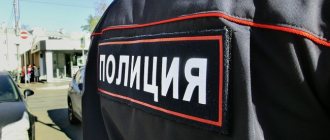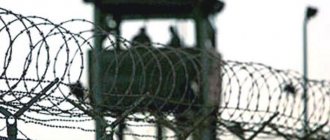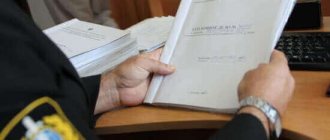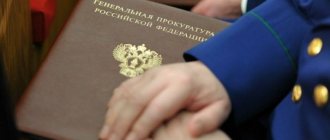What is UK
This term is understood as the main source of criminal law. The Criminal Code of the Russian Federation is the only normative act that establishes the crime and punishability of actions in the Russian Federation.
The current Criminal Code of the Russian Federation was adopted by the State Duma. This happened on May 24, 1996. A document is a codified normal act, which is characterized by internal unity. The structure of the document includes 2 parts - general and special.
The general part includes 6 sections and 17 chapters. The provisions of the articles regulate general provisions in the field of criminal law. They fix the boundaries of criminal legislation in space and time, the concept and groups of crimes, and persons who are subject to criminal liability.
The general part also includes the concept of forms and types of guilt, provisions that relate to unfinished criminal acts, complicity in crimes, and punishment. In addition, the document regulates the criminal liability of minors, the concept and content of other criminal legal measures.
The special part of the document includes 6 sections and 19 chapters. It describes the elements of certain crimes and lists the sanctions for their commission. The system serves as a reflection of the priorities of criminal law protection. In this case, the first place is given to crimes that are committed against the individual, and only after that are unlawful acts in the sphere of public security, economics, military service, and state power.
Criminal law norms are present in the articles of the code. In this case, one article may contain one or several norms at once. Most of the code's articles are divided into fragments. They are separated into separate paragraphs and indicated by numbers. Parts of articles include clauses that are designated by letters. In addition, individual articles in the special part contain notes. They help to reveal criminal legal concepts or formulate criminal legal institutions.
Expert opinion
Karnaukh Ekaterina Vladimirovna
Graduated from the National University of Shipbuilding, majoring in Enterprise Economics
The code uses continuous numbering of articles, sections and chapters. If the code includes new articles or chapters, the numbering of existing ones does not change. In this case, the added articles or chapters receive the number of the code unit closest in content with the addition of a digital designation. It is written with a period or as a superscript. If an article is excluded, the numbering of the remaining articles does not change. At this point the corresponding entry is simply performed.
Definition of the Code of Criminal Procedure
This abbreviation stands for Code of Criminal Procedure. This term is understood as a normative act regulating criminal procedural law. If we consider this concept more specifically, it refers to the procedure of criminal proceedings in the courts.
The main purpose of such a document is to protect the rights of people who have suffered as a result of an unlawful act. The Code of Criminal Procedure is also aimed at protecting persons who are unfoundedly accused of committing a crime or are being persecuted.
The Criminal Procedure Code regulates the key features of legal proceedings. These include the following:
- It is prohibited to make decisions that degrade the dignity of the accused person. This also applies to other participants in criminal proceedings.
- It is prohibited to take actions that endanger the life and health of the main participants in the process.
- Cruel treatment of participants in criminal proceedings must not be tolerated.
- It is prohibited to detain or arrest citizens without legal grounds.
The Code of Criminal Procedure of the Russian Federation includes several components. These include the following:
- Basic provisions. These include general rules of legal proceedings.
- Pre-trial proceedings. The second part examines in detail criminal practice at the stage of initiating a criminal case and pre-trial proceedings.
- Judicial proceedings. This section describes the procedure for proceedings in the courts of first instance, before magistrates, and in courts of second instance. This also applies to jury trials. In addition, the section is responsible for reviewing the verdict, rulings and court orders that have entered into legal force.
- Special procedure for criminal proceedings. Here the characteristic features of legal proceedings in special situations are recorded. This applies to cases of minors or issues of forced treatment. Other similar situations are also considered.
- International relations in the field of criminal proceedings. This part regulates the principle of joint work of courts, prosecutors, and investigators. It also concerns the bodies of inquiry with the relevant officials or bodies and associations of other countries.
- Forms of procedural documents. This section includes not only the list of procedural documents itself, but also the features of their design and use.
Who has the right to make a procedural decision to detain a suspect?
After actual detention, the person must be delivered to the inquiry or preliminary investigation agency to make a procedural decision on his detention.
According to Art. 91 of the Code of Criminal Procedure of the Russian Federation the right to detain a suspect is vested in: an investigator or an interrogating officer (inquiry body).
The right of the body of inquiry, and not the interrogator personally, to detain a suspect occurs when this body carries out urgent investigative actions in accordance with Art. 157 Code of Criminal Procedure of the Russian Federation. In this case, the investigator must coordinate his decision with the head of the inquiry body. The investigator is an official authorized, within the limits of his competence, to carry out a preliminary investigation in a criminal case, as well as some other procedural powers provided for by law (Article 38 of the Code of Criminal Procedure of the Russian Federation).
Currently in the Russian Federation, preliminary investigation bodies exist in the system of four federal departments: the Investigative Committee of the Russian Federation, the Ministry of Internal Affairs of Russia, the FSB of Russia and the Federal Drug Control Service of Russia. Moreover, regardless of departmental affiliation, all investigators have the same criminal procedural powers, including arrest. At the same time, in order to be able to begin to exercise these powers, the investigator must accept the corresponding criminal case for his proceedings (Part 2 of Article 156 of the Code of Criminal Procedure of the Russian Federation). Initially, the decision to accept a criminal case for proceedings is included as one of the clauses in the resolution to initiate a criminal case. However, investigators may change throughout the preliminary investigation; Additional employees may be involved in the investigation, etc. Therefore, each new investigator, starting to work on a criminal case, is obliged to make his own decision on accepting the criminal case for his proceedings. Without such a decision, all subsequent procedural acts of the investigator, including the detention of the suspect, will be illegal.
The powers of the investigator, in particular the right to detain a suspect, are also possessed by the head of the investigative body - the official heading the corresponding investigative unit (investigative department, department, etc.), as well as his deputy (clause 38.1 of the Code of Criminal Procedure of the Russian Federation).
Inquiry bodies are government bodies and officials authorized to carry out:
— inquiry as a form of preliminary investigation (Article 32 of the Code of Criminal Procedure of the Russian Federation);
- carrying out urgent investigative actions in criminal cases for which a preliminary investigation is mandatory (parts 1-3 of Article 157 of the Code of Criminal Procedure of the Russian Federation); carrying out investigative actions on behalf of the investigator (part 4 of article 157 of the Code of Criminal Procedure of the Russian Federation).
In accordance with Part 1 of Art. 40 of the Criminal Procedure Code the bodies of inquiry include:
- executive authorities vested with powers to carry out operational investigative activities, namely: internal affairs bodies, bodies of the FSB of Russia, customs bodies, bodies of the Federal Drug Control Service of Russia, as well as bodies of the FSO of Russia, bodies of the SVR of Russia, bodies of the Federal Penitentiary Service of the Russian Federation and operational divisions of foreign intelligence agencies of the Russian Ministry of Defense (Parts 1-2 of Article 13 of the Law “On Operational-Investigative Activities);
— officials of the Federal Bailiff Service of the Russian Federation;
- commanders of military units, formations, heads of military institutions or garrisons;
— state fire supervision authorities of the Federal Fire Service of the Ministry of Emergency Situations of Russia.
In practice, situations often arise when a crime is committed far from populated areas, and sometimes even outside the main territory of the Russian Federation. Consequently, the rapid arrival of an official of the investigative agency at the scene to investigate a criminal case is also very difficult. Therefore, in accordance with Part 3 of Art. 40 of the Code of Criminal Procedure of the Russian Federation, the powers of the inquiry body to initiate criminal cases and carry out urgent investigative actions, including the detention of a suspect, are also vested in:
- captains of sea and river vessels on long voyages;
— leaders of geological exploration parties and wintering camps located in remote places;
— heads of diplomatic missions and consular offices of the Russian Federation.
The body of inquiry is a collegial subject of law enforcement. Structurally, it consists of the following links:
- head of the inquiry body;
- head of the investigation unit;
— interrogator.
The head of the inquiry body is an official who exercises general management of the inquiry body, as well as departmental control over the activities of the investigators. For example, these are the head of the district department of internal affairs, the head of the line department of internal affairs in transport.
The head of the inquiry unit is an official of the inquiry body who heads the corresponding specialized unit that carries out the preliminary investigation in the form of an inquiry, as well as his deputy (for example, the head of the inquiry department at the district department of internal affairs, etc.).
An investigator is an official who is entrusted with the direct exercise of the powers of the inquiry body (Article 41 of the Code of Criminal Procedure of the Russian Federation). At the same time, he, like the investigator, must accept the criminal case for his proceedings before beginning to exercise his powers.
What is the difference between the Criminal Code and the Criminal Procedure Code of the Russian Federation
The regulatory documents under consideration have many differences. The Criminal Code is a specific set of rules and definitions. They not only denote key concepts, but also provide for a number of sanctions for committing crimes, as well as conditions for prosecution.
The Criminal Procedure Code only defines the procedure for receiving applications and communications. The document also regulates the conduct of inquiries and investigative actions. It contains information regarding the types of sentences, as well as options for appealing them. At the same time, the Criminal Code fixes substantive rules of law, and the Criminal Procedure Code fixes procedural ones.
Expert opinion
Karnaukh Ekaterina Vladimirovna
Graduated from the National University of Shipbuilding, majoring in Enterprise Economics
Another significant difference is the retroactive force of the law. According to the Criminal Code, crimes are classified on the day they are committed. The specifics of the investigation and the conduct of the trial are regulated by the current version of the Criminal Procedure Code. Thus, this document is characterized by retroactive force.
The Criminal Code contains not only a general, but also a special part. It includes an exhaustive list of crimes and sanctions for committing illegal actions. The Code of Criminal Procedure includes only the general part. It is important to take into account that criminal legislation as a whole is subject to the analogy of law. It is characterized by exclusively direct action.
AZ-libr.ru
Article 369. Grounds for canceling or changing the sentence of the court of first instance 1. The grounds for canceling or changing the sentence of the court of first instance and issuing a new sentence are: 1) discrepancy between the conclusions of the court set out in the sentence and the actual circumstances of the criminal case established by the court of appeal - in cases provided for in Article 380 of this Code; 2) violation of the criminal procedural law - in cases provided for in Article 381 of this Code; 3) incorrect application of the criminal law - in cases provided for in Article 382 of this Code; 4) injustice of the imposed punishment - in cases provided for in Article 383 of this Code. 2. The verdict of the court of first instance may be changed in the direction of worsening the situation of the convicted person only upon the proposal of the prosecutor or a complaint from the victim, private prosecutor or their representatives.Comm. Kutsova E.F.
1. The court has the right to cancel or change the verdict of the court of first instance based on the results of the trial of a criminal case on appeal only if there is one of the grounds provided for in the commented article. Having established such a basis, the said court is obliged to make an appropriate decision (unless this is prevented by the prohibition of a turn for the worse). 2. The discrepancy between the court’s conclusions set out in the verdict and the actual circumstances of the criminal case established by the appellate court occurs in situations provided for in Article 380 of the Code of Criminal Procedure of the Russian Federation (see commentary to it). 3. On the grounds for canceling or changing the sentence of the magistrate specified in clauses 2-4 of part 1 of the article under comment, see the commentary, respectively, to Articles 381-383 of the Code of Criminal Procedure of the Russian Federation. 4. Since the court of appeal is conducting a judicial investigation, the Code of Criminal Procedure of the Russian Federation allowed the sentence to be changed by this court in a direction that worsens the situation of the convicted person. The appellate court has the right to aggravate: the factual side of the accusation established in the verdict of the first instance court; criminal legal qualification of the actions of the convicted person; measure of punishment, etc. 5. Such a change is permissible only upon the proposal of the prosecutor or a complaint from the victim, private prosecutor or their representatives. 6. The law (Part 2 of the commented article) does not contain an express requirement that in order to change the sentence in a direction that worsens the situation of the convicted person, the prosecutor’s presentation or the above-mentioned complaints must be applied precisely for reasons that worsen the situation of the convicted person. For such a change, judging by the text of part 2 of the commented article, the very fact of the existence of a submission or complaint from one of the named persons is sufficient. For example, if there is a presentation from the prosecutor brought in connection with a violation of the criminal procedure law, the appellate court, finding it necessary, has the right to aggravate the sentence of the convicted person. However, such an interpretation of Part 2 of the commented article would contradict the fact that the court is not a criminal prosecution body, as well as the task of ensuring the rights of the convicted person. It seems that the presence of a presentation or complaint from the persons named in Part 2 of the commented article gives the appellate court the right to change the sentence in a direction that worsens the situation of the convicted person, if the presentation or complaint is made precisely on such grounds.
comparison table
The main features of the concepts under consideration are given in the table:
| Criterion | UK | Code of Criminal Procedure |
| Purpose | Required to define the very concept of crimes and responsibility for them. | Required to determine the procedure for punishing offenders. |
| Content | Includes rules of substantive law. | Contains rules of procedural law. |
| Retroactive force | Doesn't have it. | It has. |
| Composition of the document | Includes general and special parts. | Contains only the general part. |







